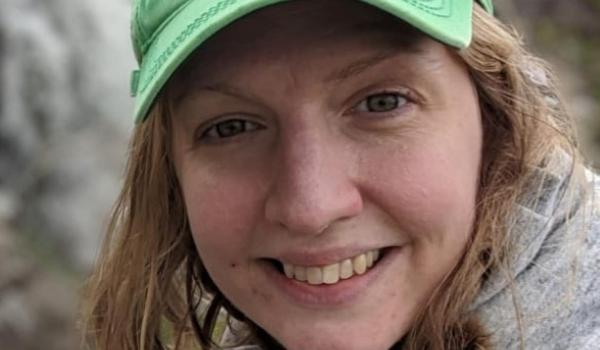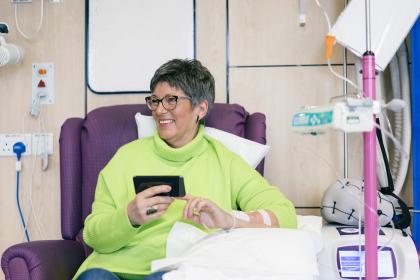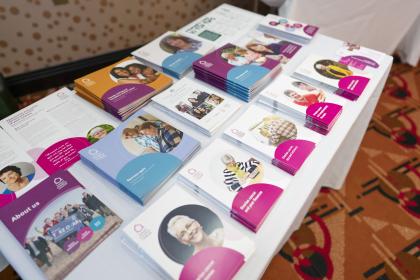Gillian experienced a long and difficult 18 months between first noticing her symptoms and receiving an accurate diagnosis. Here she talks about her struggle with her symptoms, her perseverance to be diagnosed and how important research is for developing life-saving treatments...
Changes
Eighteen months before my diagnosis, I noticed distinctive changes in my body including nausea, urinary and bowel-related symptoms, and a loss of appetite. My GP organised a scan, which detected an unusual mass that they needed to check was nothing more sinister. However, a CA125 blood test showed results within the normal range, and they decided to treat me for IBS.
I’d already had IBS for years, and I knew this was different. A few months later I saw a gynaecologist who diagnosed a dermoid cyst. When I raised my persisting symptoms and questioned the initial medical opinion of it being ‘more sinister’, I was deemed an anxious patient, and after a follow up scan I was discharged. My initial symptoms then began to subside, and I resigned myself to believing I had erratic IBS symptoms.
Struggle
Over the next eight months or so, I experienced an array of different symptoms, and my health began to significantly impact my life. I struggled to live with increasing fatigue, as well as migraines and viral symptoms, and had to spend most weekends resting in order to get through the week ahead. During this time I had many appointments and consultations, and was given various treatments and medications, but no reason was found for my poor health.
Soon the nausea and lack of appetite returned, along with persistent pelvic pain which made me unable to go to the toilet as normal. After speaking to a new GP who ruled out kidney and urine infections, I was booked for an MRI scan. The ‘dermoid cyst’ on my left ovary had more than doubled in size, and there was a new one on my right ovary. A gynaecological consultant reassured me “we are not worried”, but agreed to repeat the CA125 blood test. Meanwhile the plan was to remove the cysts sometime later in the year.
Two weeks later I was told my CA125 levels had risen to 113 and I required an urgent CT scan. By this point I was feeling weaker than ever and often doubled up in pain. After one of the longest, slowest weeks of my life, I got a call from a consultant who said that the results of my scan showed dermoid cysts and some other stomach nodules, which had probably been there a long time, reassuring me there was nothing to worry about. At this point, I insisted I had every symptom of ovarian cancer and really needed further review, so she agreed to have the scan reviewed and another appointment arranged the following week. Upset and weak, I tried to convince myself I was imagining things.
Diagnosis
At this appointment, as I sat in numb shock, I was told I had ovarian cancer. No matter how many times I’d predicted this conversation, nothing prepares you for hearing those words. It had spread as far as the omentum and peritoneum, and I would need extensive abdominal surgery to save my life, but this would also take my fertility. This was not just life-changing, but heartbreaking. At 33 years old, I was diagnosed with stage 3C low-grade ovarian cancer. If I hadn’t pushed, and instead waited for routine surgery to remove what were suspected to be benign cysts, the disease may well have progressed to stage 4 or beyond.
Treatment through the pandemic
My surgery was almost cancelled at the last minute due to the Covid-19 pandemic, but after a tense weekend I hugged my family goodbye and went to hospital. I don’t know where I’d be without my incredible, caring family. They’ve been there every step of the way. Thankfully, the surgery was successful and I began recovery.
I began chemotherapy and had some intense side effects: most of my hair fell out, my immune system struggled and I developed a blood clot, but my excellent oncologist looked after me so well. She’s always calm and makes me feel very safe. My wonderful counsellor has also been a God-send, helping me process the trauma of the year. And my amazing consultant has gone the extra mile to get to the bottom of each issue, and been there to talk to at all hours. Especially without family visits, I’ve been so grateful to have her.
I’ve found art to be a much-needed form of escapism. I’ve written a poem expressing feelings of loss around fertility, and I began a series of portraits of the many wonderful NHS staff I’ve met along the way, as a thank you for all their kindness. These can be found on my Instagram account: @gillyartist. I find getting outdoors, exploring nature and taking up photography to be very therapeutic. But undoubtedly what got me through was my family, my friends and my Christian faith.
Support life-saving research
Being diagnosed with low-grade serous ovarian cancer meant I had limited treatment options. Because it’s a rarer form of the disease, there’s been very little research conducted into developing effective treatments for it.
This form of ovarian cancer behaves differently to others and we desperately need research to understand how it responds to treatment. The lack of research so far means we have less knowledge about what works well – that’s really tough for the 700 of us who are diagnosed with this form every year; it impacts each of our lives hugely.
After receiving my diagnosis and understanding the treatment options available, it’s clear we need to urgently fund more research for all forms of this disease to help us through a shattering diagnosis and give us the best treatment options possible.
Find out how you can support life-saving research.
If you’ve been affected by this story and would like to speak to a specialist nurse, you can call our dedicated support line on 020 7923 5475 or contact us: [email protected]. We're open from 9am until 5.30pm, Monday to Friday.





